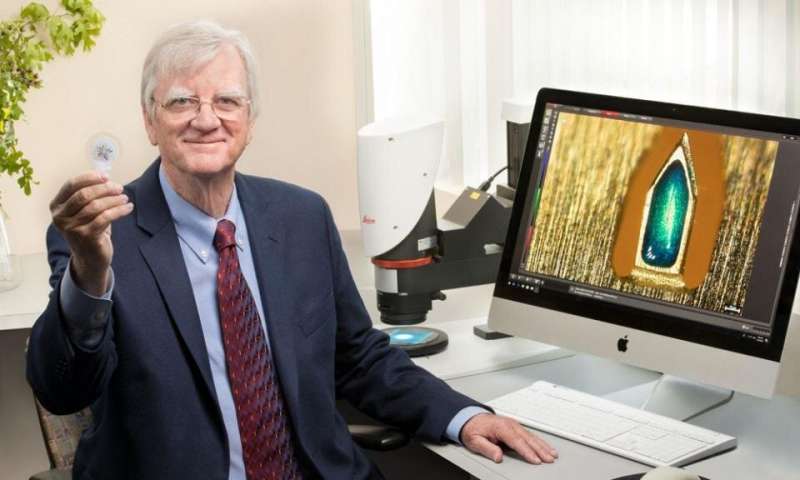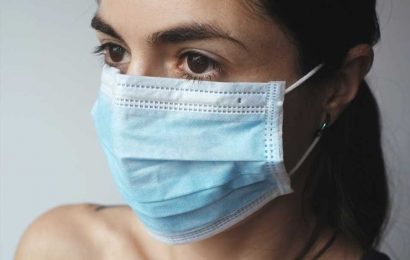
Verndari Inc., a stage biopharmaceutical company, announced today that it will begin preclinical testing this week at UC Davis’ Mouse Biology Program to evaluate a potential vaccine and delivery system for COVID-19.
Verndari’s VaxiPatch is a single-dose vaccination kit that uses a dermal patch with a metal microneedle array to deliver vaccines. The company states that the technology eliminates the need for refrigeration, facilitates high-volume, automated manufacturing of vaccines and can potentially be self-administered on the subject’s arm.
“Verndari was founded to enable a rapid response to new viral threats as well as to produce more effective vaccinations for existing viruses, such as seasonal flu, while sharply reducing costs and making vaccine administration much simpler,” said Verndari’s Chief Executive Officer Daniel R. Henderson in a release. “Our new approach and previous work enabled us to quickly bring a potential vaccine against COVID-19 to preclinical testing. UC Davis provides a world-class forum for testing, with leading researchers and a full spectrum of supporting capabilities.”
The public-private collaboration between Verndari and the University of California, Davis, provides the ideal platform to rapidly move such crucial research process forward.
“This is exactly the type of combined business and academic effort our university excels at delivering,” said David Lubarsky, vice chancellor for Human Health Sciences and CEO of UC Davis Health. “UC Davis is uniquely positioned to enable companies like Verndari to accelerate their work. By working together with us at UC Davis, we can potentially help to address this global pandemic sooner rather than later.”
Evaluation with UC Davis’ research pipeline for viral pathogens
Preclinical testing of the immune response to the vaccine begins May 1 at UC Davis’ Mouse Biology Program, where researchers amended an existing protocol for influenza to test a COVID-19 vaccine in rats. Using the established rodent model can quickly provide data related to vaccine efficacy and immune response before moving into larger species, such as nonhuman primates, and human clinical trials.
“We are comparing administration of the VaxiPatch to an injectable vaccine in rodents and monitoring them closing for any adverse reactions as well as collecting blood samples to evaluate immune responses,” said Kristin Grimsrud, veterinarian and lead scientist at the Mouse Biology Program. “Due to the impressive campuswide effort to accelerate essential COVID-19 research, we were able to get approval on the amended protocol in less than 72 hours, allowing us to focus on SARS-CoV-2 vaccines.”
Verndari is also in discussions with the California National Primate Research Center at UC Davis to conduct further testing in rhesus macaques, a powerful animal model for COVID-19.
If the preclinical testing meets safety and efficacy goals, Phase 1 human clinical trials could begin. In preparation for human trials, the company is working on an agreement with UC Davis’ Good Manufacturing Practice, or GMP, facility to manufacture the clinical version of the vaccine kit. This would include manufacturing the vaccine, loading it onto the delivery device and packaging it within the clean room’s sterile environment.
“While we are seeing hopeful evidence that physical distancing has slowed the rate of transmission in California and the Sacramento area, the world’s best hope is for a vaccine to prevent new viral infection,” said Alison Brashear, dean of the UC Davis School of Medicine. “If the skin patch technology proves viable in the preclinical models, we’ve got the facilities and expertise ready to immediately launch the necessary human clinical trials that will then test the safety and efficacy of this innovative technology.”
Leveraging scientific and entrepreneurial resources at UC Davis
The collaboration between Verndari and UC Davis exemplifies the value of industry/academic partnerships and how they can advance innovative solutions.
“We are excited to work with Verndari to move its vaccine candidate through preclinical, and potentially clinical, studies,” said Prasant Mohapatra, vice chancellor for research at UC Davis. “This collaboration illustrates one of many ways that UC Davis is leveraging our unique expertise and established platform built on previous research for HIV, Zika and human cytomegalovirus to advance knowledge and solutions specific to COVID-19.”
The company joined the university’s START program led by Venture Catalyst in March of 2016. The START program provides UC Davis-affiliated innovators and entrepreneurs the resources, training, tools and connections to develop successful startups.
Verndari is part of a network of industry partners who lease state-of-the-art life science laboratory space managed by the School of Medicine on the UC Davis Medical Center campus. This allows industry experts to work alongside top academic and clinical scientists at UC Davis, nurturing a new wave of innovation—the impetus for the creation of UC Davis Aggie Square, a 1.3 million square-foot innovation district currently in development.
The company began initial testing of an influenza vaccine at the Mouse Biology Program in 2017 using Venture Catalyst’s DART program that provides startups with access to the university’s state-of-the-art research services and equipment at competitive rates. These collaborative relationships provide not only the services to conduct animal research, but also the scientific expertise in translational animal models, study design and device development.
Source: Read Full Article


